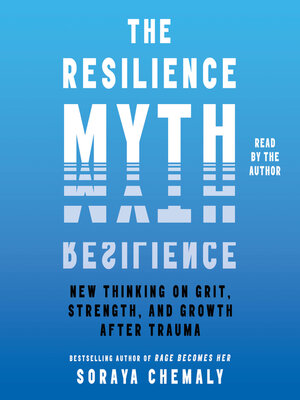The Resilience Myth
audiobook (Unabridged) ∣ New Thinking on Grit, Strength, and Growth After Trauma
By Soraya Chemaly

Sign up to save your library
With an OverDrive account, you can save your favorite libraries for at-a-glance information about availability. Find out more about OverDrive accounts.
Find this title in Libby, the library reading app by OverDrive.



Search for a digital library with this title
Title found at these libraries:
| Library Name | Distance |
|---|---|
| Loading... |
A "vital, life-saving must-read" (Nora McInerny, author of Bad Vibes Only) manifesto for communal resilience based on in-depth investigations into history, social science, and psychology, from the bestselling author of Rage Becomes Her.
We are often urged to rely only on ourselves for strength, mental fortitude, and positivity. "With her signature clarity and penetrating mind" (Jean Guerrero, author of Hatemonger), Soraya Chemaly challenges us to challenges us to reject this model—based on a culture of toxic individualism—and, instead, leverage our interdependence.
Drawing on comprehensive research and eye-opening examples from real-life, The Resilience Myth offers an "ambitious" (Publishers Weekly) feminist paradigm of resilience based on an ethic of care, cognitive flexibility, and the provision of material needs. Interdependence, collective care, and nurturing relationships to each other and the earth, she compellingly argues, are the keys to positively adapting to adversity and polycrises.
We are often urged to rely only on ourselves for strength, mental fortitude, and positivity. "With her signature clarity and penetrating mind" (Jean Guerrero, author of Hatemonger), Soraya Chemaly challenges us to challenges us to reject this model—based on a culture of toxic individualism—and, instead, leverage our interdependence.
Drawing on comprehensive research and eye-opening examples from real-life, The Resilience Myth offers an "ambitious" (Publishers Weekly) feminist paradigm of resilience based on an ethic of care, cognitive flexibility, and the provision of material needs. Interdependence, collective care, and nurturing relationships to each other and the earth, she compellingly argues, are the keys to positively adapting to adversity and polycrises.







